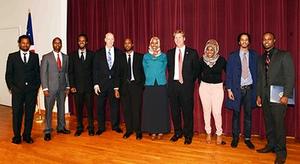Terrorist recruitmentFighting al-Shabab’s recruitment efforts in U.S. Somali community
Somali community organizations in the Minneapolis-St. Paul area are taking a proactive approach to the war against terrorist recruitment in America’s Somali community. “Given our support for the African peacekeeping mission, and the fact that the U.S. remains a top al Qaeda target, we need to get ahead of al-Shabab’s efforts to radicalize vulnerable youth,” House Foreign Affairs Committee chairman Representative Ed Royce (R-California) said in his opening remarks at the hearing on the subject earlier this month.

KaJoog organizers honored at FBI event // Source: fbi.gov
Young Somalis from the Minneapolis-St. Paul area are taking a proactive approach to the war against terrorist recruitment in America’s Somali community. Mohameed Farah, executive director of Ka Joog, testified before the House Foreign Affairs Committee earlier this month in a hearing called to assess the threat of al Qaeda affiliate al-Shabab. Al Jazeera in America reports that Ka Joog, Somali for “stay away,” is a Minneapolis based community group launched in 2007 at a time when al-Shabab heavily recruited Westerners for membership. Ka Joogencourages young Somalis to reject radicalization, drugs, violence, gangs, and other negative influences. The group aims to develop a positive image of Somalia and Somali immigrants in America.
Last month’s al-Shabab attack on the Westgate mall in Nairobi has focused attention on terrorism recruitment in America’s Somali community. “Given our support for the African peacekeeping mission, and the fact that the U.S. remains a top al Qaeda target, we need to get ahead of al-Shabab’s efforts to radicalize vulnerable youth,” House Foreign Affairs Committee chairman Representative Ed Royce (R-California) said in his opening remarks at the hearing. Members of Ka Joog cautioned the committee to go beyond a discussion of counterterrorism measures and instead invest in the immigrant community. “As Americans, we see Somalis on television going out and killing people,” said Abdifatah Farah Ali, a Ka Joog founding member. “But we never look at the underlying issues. A lot happened to these young men to get them to that extreme place.”
Economic hardships, lack of mentorship, and no sense of direction often leave young Somalis vulnerable to extreme measures. Representative Keith Ellison (D-Minnesota) told Al JazeeraAmerica Tonight that in addition to facing the same issues most immigrants face upon arriving in America, Somalis have additional concerns. “They are subject to everything else that low-income kids of color are subject to, but they have one more problem: They have Muslim names, and maybe their language skills are not that strong. So, they are vulnerable.” Ellison believes that as young Somali immigrants are vulnerable to gang and criminal activity, an al-Shabab membership is often a more enticing option compared to life in the United States.
Al-Shabab’s recruiting effort is largely focused on tapping into the cultural disconnect many young Somali-Americans experience. “Somalis have a very intimate culture,” Farah said. “We all know each other. So when we are ripped away from our families at a young age, many feel very alone. That’s where they are vulnerable. That’s where they seek something meaningful.”
Ka Joog is working with law enforcement to respond to issues in the Somali community before they escalate. “In order for our community to move forward on these issues,” Ali said, “we needed to tell them about who we are and where we come from. So that when that thing happens in the community,” he said, “whether it’s a kid that got recruited, or someone who was stopped at the border, those necessary actions are taken. The community is actually for getting these negative seeds out.”
